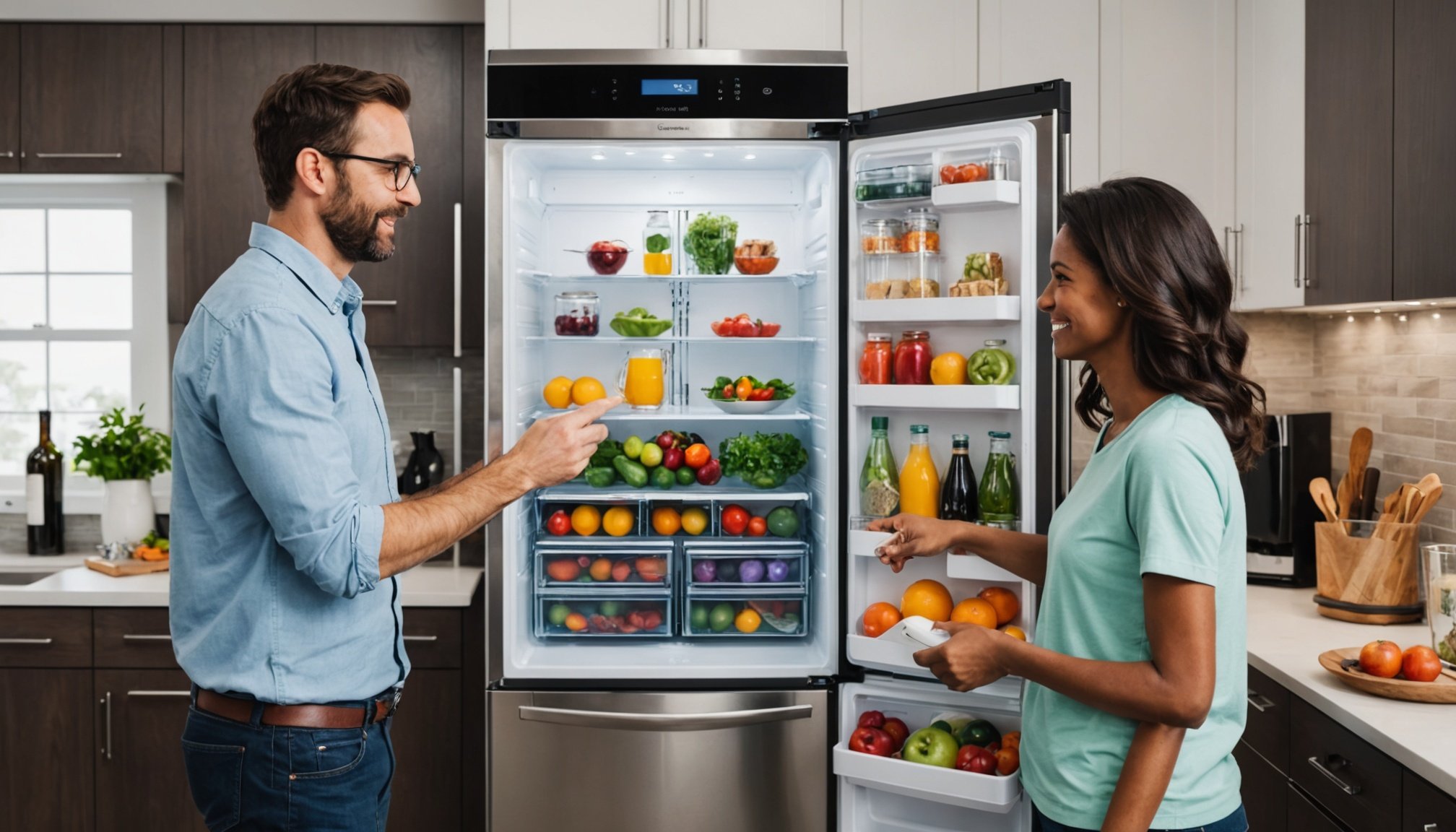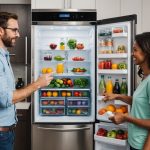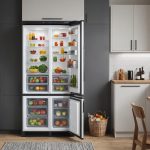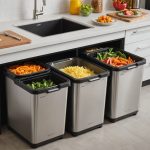Essential Innovative Features of Smart Refrigerators
Today’s smart refrigerators integrate cutting-edge technology that revolutionises kitchen experiences. Understanding these features is vital for maximising convenience and efficiency.
Advanced technology in modern refrigerators has led to features that save energy and improve food management. For instance, many smart models come equipped with built-in cameras that allow users to check the contents via a smartphone app, even when away from home. This innovation not only helps manage food inventory but also reduces waste by informing purchasing decisions.
This might interest you : Discover the best heat-resistant countertop materials for hot pots and pans: your comprehensive guide
Another vital feature is energy-efficient compressors and insulation. These components adjust their performance based on usage patterns, significantly reducing electricity consumption. Smart refrigerators often come with energy-tracking applications, allowing users to monitor and manage their appliance’s usage effectively.
Voice control and connectivity options are also key advancements in smart refrigerators. With the ability to interface with home assistants like Alexa or Google Home, users can set reminders, create shopping lists, and even control temperature settings with simple voice commands. This integration of advanced refrigerator technology offers unparalleled convenience and efficiency.
Also read : Window sill wonders: your ultimate guide to growing a thriving herb garden in miniature greens
Incorporating these innovative features, modern refrigerator technology not only redefines usability but also ensures sustainable and efficient home management. Understanding these functionalities is crucial when consulting a buying guide to make informed decisions and optimise kitchen operations.
Energy Efficiency
In today’s environmentally conscious society, energy-efficient refrigerators are increasingly sought after for their eco-friendly features and substantial energy savings. When discussing energy ratings, it is vital to understand their significance. An energy rating informs consumers of a refrigerator’s efficiency level, helping them make informed choices. Higher rated models often lead to significant reductions in electricity bills.
Modern refrigerators often incorporate features that enhance energy efficiency. Inverter compressors are a prime example, offering more precise cooling by adjusting to fluctuating temperatures with ease. This not only consumes less energy but also extends the appliance’s lifespan. Additionally, LED lighting inside the fridge requires less power than traditional bulbs, significantly contributing to overall energy savings.
When comparing energy consumption, the difference between traditional and smart refrigerators becomes evident. Traditional models often lack the innovative eco-friendly features that optimise power use. On the other hand, smart refrigerators can adjust their operation based on usage patterns, further enhancing energy savings. These advanced models integrate technology to monitor and regulate their energy output intelligently.
By choosing energy-efficient options, consumers not only benefit from reduced utility costs but also contribute positively to environmental conservation.
Connectivity Options
In the realm of smart refrigerator connectivity, Wi-Fi features and Bluetooth functionalities play pivotal roles. These technologies allow IoT-enabled appliances to seamlessly integrate into a connected home environment. With Wi-Fi, users experience enhanced convenience through remote access, enabling them to adjust temperature settings, check inventory, or monitor energy usage from virtually anywhere using a smartphone. Bluetooth, on the other hand, supports local connectivity for quick device pairing and interaction.
For instance, imagine you’re at the grocery store and unsure about what’s missing at home. Through Wi-Fi features, your refrigerator can send a real-time inventory list to your smartphone. This kind of integration enhances convenience, ensuring that you buy just what you need.
Smart refrigerators often synchronize with various smart home systems and devices like Amazon Alexa, Google Assistant, or Apple HomeKit. This compatibility allows users to control their appliances using simple voice commands. For instance, “Alexa, check my fridge’s temperature,” offers immediate control without the need to physically interact with the appliance.
Incorporating IoT in appliances transforms the user experience, leading to a smart, interconnected lifestyle. By leveraging both Wi-Fi and Bluetooth, smart refrigerators provide not only utility but also an engaging interaction model, enhancing home automation’s reach and impact.
Smart Notifications and Alerts
In the realm of cutting-edge household appliances, smart notifications play a pivotal role in enhancing convenience and efficiency. These systems notify users about any significant change within the refrigerator, such as unexpected temperature fluctuations or when maintenance is required. Temperature alerts are particularly essential, as they help prevent food spoilage. These notifications ensure that users can quickly react to any issue, maintaining the quality and longevity of stored items.
Moreover, some refrigerators offer advanced food management tools. These tools keep track of expiration dates and even suggest meal plans to optimize the use of ingredients. Such features protect the health of your family by minimizing the risk of consuming outdated food, thereby promoting sustainable living by reducing waste.
Different brands and models offer varying types of refrigerator alerts. For instance, some models opt for simple text notifications, while others provide more immersive interactions via smartphone applications. Alerts can differ in frequency and detail, with some refrigerators providing comprehensive suggestions on rectification measures.
Ultimately, the benefits of smart notifications and alerts enhance user experience and ensure food safety, making them worthwhile features when considering a new refrigerator purchase. The right system can significantly impact household management, reinforcing efficient and informed decision-making.
Food Management Tools
Managing food efficiently at home is greatly simplified by smart refrigeration technology. Inventory tracking features are at the forefront of this advancement. By scanning and logging food items, these systems help in minimising food waste, ensuring nothing goes unnoticed until it’s too late. This level of organisation can be pivotal in reducing household costs associated with discarded groceries.
Meal Planning Features
Integrated into many smart refrigerators are meal planning features. These tools analyse the items in your fridge, suggesting recipes based on available ingredients, which can ease the daily challenge of deciding what to cook. By doing so, they encourage healthier meal options and contribute to a more balanced diet. Combining inventory tracking and meal planning, these features allow for a seamless kitchen experience, tailored to individual preferences.
Positive user feedback further underscores the effectiveness of food management tools. Many report increased efficiency in meal prep and a noticeable reduction in spoilage. Such tools not only revolutionise how kitchens function but also empower users to make informed choices, fostering a sustainable lifestyle. The convenience and intuitive nature of these features truly resonate, reinforcing their value in modern homes.
User Reviews and Comparisons
Exploring smart refrigerator reviews can offer valuable insights into their strengths and weaknesses—critical factors when considering a purchase. Users often emphasize distinct features that stand out in popular models. For instance, some rave about energy efficiency and innovative cooling technologies, while others highlight connectivity as a major advantage, allowing seamless integration with other smart home devices.
When navigating model comparisons, it’s essential to understand what sets each brand apart. Some top brands offer unique features like customizable compartments or voice-assistant compatibility, which can greatly enhance user experience. Other models focus on durability and design, offering a more traditional yet advanced option for those prioritizing longevity.
Consumer feedback plays a crucial role as it reflects real-world experiences, helping potential buyers make informed decisions. Here are a few considerations to keep in mind:
- Energy Efficiency: A key feature for environmentally-conscious users.
- Connectivity Options: For those seeking a fully integrated smart home.
- Design Flexibility: To suit varying aesthetic preferences.
Reviews often reveal unforeseen quirks or issues, aiding consumers in weighing potential trade-offs. By thoroughly examining user feedback, one can confidently select a model that aligns with their needs, ensuring satisfaction with their smart refrigerator purchase.
Purchasing Tips for Smart Refrigerators
When selecting a smart refrigerator, several factors should be considered beyond just its features. Start by assessing the size that fits your kitchen layout and storage needs. A thorough refrigerator selection guide suggests checking for energy efficiency, which can lead to significant savings in the long run.
Understanding how to evaluate brands is crucial. Look for companies with a reputation for reliability and exceptional after-sale service. Brands that offer extended warranty or easy repair services can add peace of mind. Scrutinise customer reviews to gauge real-world reliability.
Budget considerations play a vital role in your decision. Set a clear budget to narrow down choices without financial strain. Many retailers offer financing options with zero-interest plans, making it easier to afford a higher-quality appliance than your budget may allow upfront. Explore these options carefully to determine what’s best for your financial situation.
For smart appliances, consider the compatibility with your existing home ecosystem. It’s advisable to verify that the smart refrigerator pairs seamlessly with your other smart gadgets. Also, check for any cloud services they might rely on and ensure they’re stable and secure. These smart appliance advice tips can significantly aid in making a well-informed decision.











